- Home
- Patricia Cornwell
Scarpetta 18 - Port Mortuary Page 16
Scarpetta 18 - Port Mortuary Read online
Page 16
The most blatant sign of my six-month absence from a position I’ve yet to really fill is that Bryce’s adjoining administrative office is comfortably cluttered while mine is empty and stark. It feels forlorn and lonely in here, my small conference table of brushed steel bare, not even a potted plant on it, and when I inhabit a space there are always plants. Orchids, gardenias, succulents, and indoor trees, such as areca and sago palms, because I want life and fragrances. But what I had in here when I moved in is gone and has been gone, overwatered and too much fertilizer. I gave Bryce detailed instructions and three months to kill everything. It took him less than two.
There is virtually nothing on my desk, a bow-shaped modular work station constructed of twenty-two-gauge steel with a black laminate surface and a matching hutch of file drawers and open shelves between expansive windows overlooking the Charles and the Boston skyline. A black granite countertop behind my Aeron chair runs the length of the wall and is home to my Leica Laser Microdissection System and its video displays and accoutrements, and nearby is my faithful backup Leica for daily use, a more basic laboratory research microscope that I can operate with one hand and without software or a training seminar. There isn’t much else, no case files in sight, no death certificates or other paperwork for me to review and initial, no mail, and very few personal effects. I decide it’s not a good thing to have such a perfectly arranged, immaculate office. I’d rather have a landfill. It’s peculiar that being faced with an empty work space should make me feel so overwhelmed, and as I seal Erica Donahue’s letter in a plastic bag I finally realize why I’m not a fan of a world that is fast becoming paperless. I like to see the enemy, stacks of what I must conquer, and I take comfort in reams of friends.
I’m locking the letter in a cabinet when Lucy silently appears like an apparition in a voluminous white lab coat she wears for its warmth and what she can conceal beneath it, and she’s also fond of big pockets. The oversized coat makes her seem deceptively nonthreatening and much younger than her years, in her low thirties is the way she puts it, but she’ll forever be a little girl to me. I wonder if mothers always feel that way about their daughters, even when the daughters are mothers themselves, or in Lucy’s case, armed and dangerous.
She probably has a pistol tucked into the back waistband of her cargo pants, and I realize how selfishly happy I am that she’s home. She’s back in my life, not in Florida or with people I have to force myself to like. Manhattan prosecutor Jaime Berger is included in this mix. As I look at my niece, my surrogate only child, walking into my office, I can’t avoid a truth I won’t tell her. I’m glad if she and Jaime have called it quits. That’s really why I haven’t asked about it.
“Is Benton still with you?” I inquire.
“He’s on the phone.” She shuts the door behind her.
“Who’s he talking to at this hour?”
Lucy takes a chair, pulling her legs up on the seat, crossing them at the ankles. “Some of his people,” she says, as if to imply he’s talking to colleagues at McLean, but that’s not it. Anne is handling the hospital, and she and Marino are there and getting started on the scan. Why would Benton be talking to them or anyone else at McLean?
“It’s just the three of us, then,” I comment pointedly. “Except for Ron, I assume. But if you want the door shut, I suppose that’s fine.” It’s my way of letting her know that her hypervigilant and secretive behavior isn’t lost on me and I wish she would explain it. I wish she would explain why she feels it necessary to be evasive if not blatantly untruthful to me, her aunt, her almost-mother, and now her boss.
“I know.” She slides a small evidence pillbox out of her lab coat pocket.
“You know? What do you know?”
“That Anne and Marino went to McLean because you want an MRI. Benton filled me in. Why didn’t you go?”
“I’m not needed and wouldn’t be particularly helpful, since MR scans aren’t my specialty.” There is no MRI scanner at Dover’s port mortuary, where most bodies are war casualties and are going to have metal in them. “I thought I’d take care of a few things, and when I’m satisfied I know what I’m looking for, I’ll get started on the autopsy.”
“Kind of a backward way to look at things, when you stop to think about it,” Lucy muses, her eyes green and intensely fixed on me. “It used to be you did the autopsy so you knew what you were looking for. Now it’s just a confirmation of what you already know and a means of collecting evidence.”
“Not exactly. I still get surprises. What’s in the box?”
“Speaking of.” She slides the small white box across the unobstructed surface of my ridiculously clean desk. “You can take it out and don’t need gloves. But be careful with it.”
Inside the box on a bed of cotton is what looks like the wing of an insect, possibly a fly.
“Go ahead, touch it,” Lucy encourages, leaning forward in her chair, her face bright with excitement, as if she’s watching me open a gift.
I feel the stiffness of wire struts and a thin transparent membrane, something like plastic. “Artificial. Interesting. What is this exactly, and where did you get it?”
“You familiar with the holy grail of flybots?”
“I confess I’m drawing a blank.”
“Years and years of research. Millions and millions of research dollars spent on building the perfect flybot.”
“Not intimately aware of it. Actually, I don’t think I know what you’re talking about.”
“Equipped with micro-cameras and transmitters for covert surveillance, literally for bugging people. Or for detecting chemicals or explosives or possibly even biological hazards. The work’s been going on at Harvard, MIT, Berkeley, a number of places here and overseas, even before cyborgs, those insects with embedded micro-electromechanical systems, machine-insect interfaces. Which then spread to doing shit like that to other living creatures, like turtles, dolphins. Not DARPA’s finest moments, you ask me.”
I place the wing back on the square of cotton. “Let’s back up. Start with where you got this.”
“I’m worried.”
“You and me both.”
“When Marino had him in ID this morning”—Lucy means the dead man from Norton’s Woods—“I wanted to tell him about the recording system I discovered in the headphones, so I go downstairs. He’s fingerprinting the body, and I notice what at a glance looks like a fly wing stuck to the guy’s coat collar along with some other debris, like dirt and pieces of dead leaves from his being on the ground.”
“It didn’t get dislodged by the EMTs,” I comment. “When they opened his coat.”
“Obviously, it didn’t. Was snagged on the fur, the fake-fur collar,” Lucy says. “Something struck me about it, you know, I got a funny feeling and I took a closer look.”
I get a hand lens out of my desk drawer and turn on an examination light, and in the bright illumination the magnified wing doesn’t look natural anymore. What one would assume is the base of the wing, where it attaches to the body, is actually some sort of flexure joint, and the veins running through the wing tissue are shiny like wires.
“Probably a carbon composite, and there are fifteen joints in each wing drive, which is pretty amazing.” Lucy describes what I’m seeing. “The wing itself is an electroactive polymer frame, which responds to electrical signals, causing the fanfold wings to flap as fast as the real deal, your everyday housefly. Historically, a flybot takes off vertically like a helicopter and flies like an angel, which has been one of its major design obstacles. That and coming up with something micromechanical that’s autonomous but not bulky—in other words, biologically inspired so it has the necessary power to move around freely in whatever environment you put it in.”
“Biologically inspired, like da Vinci’s conceptualized inventions.” I wonder if she is reminded of the exhibition I took her to in London and if she noticed the poster in the living room of the dead man’s apartment. Of course she noticed. Lucy notices everything.
> “The poster over the couch,” she says.
“Yes, I saw it.”
“In one of the video clips, when he was putting the leash on his dog. How creepy is that?” Lucy says.
“I’m not sure I know why it’s creepy.”
“Well, I had the luxury of looking at the recordings more carefully than you did.” Lucy’s demeanor again, the nuances I’ve come to recognize as surely as I detect the subtle changes in tissue under the microscope. “It’s for the same exhibition you took me to at the Courtauld, has the date on it for that same summer,” she says calmly and with a certain goal in mind. “We might have been there when he was, assuming he went.”
That’s the goal. This is what Lucy thinks. A connection between the dead man and us.
“Having the poster doesn’t mean he did,” she goes on. “I realize that. It doesn’t mean it in a way that would hold up in court,” she adds with a hint of irony, as if she’s making a dig at Jaime Berger, the prosecutor I’m increasingly suspicious she’s no longer with.
“Lucy, do you have some idea of who this man is?” I go ahead and ask.
“I just think it’s bizarre to consider he might have been at that gallery when we were. But I’m certainly not saying he was. Not at all.”
It’s not what she really thinks. I can see it in her eyes and hear it in her voice. She suspects he might have been there when we were. How could she begin to conclude such a thing about a dead man whose name we don’t know?
“You’re not hacking again,” I say bluntly, as if I’m asking about smoking or drinking or some other habit that could be bad for her health.
I’ve thought more than once that Lucy might have found a way to trace the covertly recorded video files to a personal computer or server somewhere. To her, a firewall and other security measures to protect proprietary data are nothing more than a speed bump on the road to getting what she wants.
“I’m not a hacker,” she says simply.
That’s not an answer, I think but don’t say.
“I just find it an unusual coincidence that he might have been at the Courtauld when we were,” she goes on. “And I think it’s likely he has that poster because he has some connection to that exhibit. You can’t buy them now. I checked. Who would have one unless they went or someone close to them did?”
“Unless he’s much older than he looks, he would have been a child then,” I point out. “That was in the summer of 2001.”
I’m reminded that the time on his watch was five hours ahead of what it should have been for this part of the world. It was set for the United Kingdom’s time zone, and the exhibition was in London. That proves nothing. A consistency but not evidence, I tell myself.
“That exhibit was exactly the kind of thing a precocious little inventor in the making would love,” Lucy says.
“The same way you did,” I reply. “I think you walked through it four times. And you bought the lecture series on CD, you were so enthralled.”
“It’s quite a thought. A little boy in the gallery at the exact moment we were.”
“You say that as if it’s a fact.” I continue to push the same point.
“And almost a decade later I’m here, you’re here, and his dead body is here. Talk about six degrees of separation.”
It jolts me to hear her refer to something else I was thinking about earlier. First the London exhibit, now the great web that is all of us, the way lives around the planet somehow interconnect.
“I never really get used to it,” she is saying. “Seeing someone and then later they’re murdered. Not that I can envision him as a boy at a gallery in London, not that I see some little kid’s face in my mind. But I might have been standing next to him or even talked to him. In retrospect it’s always hard to comprehend that if you had known what was ahead, maybe you could have changed someone’s destiny. Or your own.”
“Did Benton tell you the man from Norton’s Woods was murdered, or did you get that from someone else?”
“We were catching up.”
“And you told him about the flybot while you were just now catching up inside your lab.” It’s not a question.
I feel sure she’s told Benton about the robotic fly wing and whatever else she thinks he should know. She’s the one who was emphatic in the helicopter a little while ago that he is the only person she really trusts right now, except for me. Although I don’t exactly feel trusted. I sense she is sifting through information and selective about what she offers when I wish she wouldn’t hold back. I wish she wouldn’t be evasive or lie. But one thing I’ve learned about Lucy is that wishing makes nothing true. I can wish my life away with her and it won’t change her behavior. It won’t change what she thinks or does.
I turn off the lamp and return the small white box to her. “What do you mean, ‘flies like an angel’?”
“Those artistic renderings of angels hovering. I know you’ve seen them.” Lucy reaches for a pad of call sheets and a pen neatly placed next to the phone. “Their bodies are vertical, like someone with a jet pack on, as opposed to insects and birds, whose bodies are horizontal in flight. These little flybots fly vertically, like angels, and that’s been one of their flaws, that and their size. Finding the solution is what I mean by ‘holy grail.’ It’s eluded the best and the brightest.”
She sketches something to show me, a stick figure that looks like a cross flying through the air.
“If you want an insect like a common housefly to literally be a fly on the wall conducting covert surveillance,” she continues, “it should look like a fly, not like a tiny body that’s upright with wings attached. If I were having a meeting in Iran with Ahmadinejad and something flew by vertically and landed vertically on a windowsill like a micro-Tinker Bell, I believe I’d notice it and be slightly suspicious.”
“If you were meeting with Ahmadinejad in Iran, I’d be slightly suspicious for a lot of reasons. Forgetting why my patient had the wing of one of these things on his coat, assuming this wing is part of an intact flybot—” I start to say.
“Not exactly a flybot,” she interrupts. “Not necessarily a spybot, either. That’s what I’m getting to. I think this is the holy grail.”
“Then whatever it is, what might it have been used for?”
“Let your imagination be the limit,” she answers. “I could make quite a list but can’t know definitively, not from one wing, although I can tell a few things that are significant. Unfortunately, I couldn’t find the rest of it.”
“You mean on the body, on his coat? Find it where?”
“At the scene.”
“You went to Norton’s Woods.”
“Sure,” she says. “As soon as I realized what the wing was from. Of course I headed straight there.”
“We were together for hours.” I remind her that she could have told me before now. “Just you and me in the cockpit all the way here from Dover.”
“Funny thing about the intercom. Even when I’m sure it’s off in back, I’m still not sure. Not if it’s something I can’t afford having anyone overhear. Marino shouldn’t know about this.” She indicates the small white box with the wing in it.
“Why exactly?”
“Believe me, you don’t want him to know a damn thing about it. It’s a very small piece of something a lot bigger, in more ways than one.”
She goes on to assure me that Marino knows nothing about her going to Norton’s Woods. He is unaware of the tiny mechanical wing or that it was a motivating factor in her encouraging him to bring me home from Dover early, to safely escort me in her helicopter. She didn’t mention any of this to me until now, she continues to explain, because she doesn’t trust anyone at the moment. Except Benton, she adds. And me, she adds. And she’s very careful where she has certain conversations, and all of us should be careful.
“Unless the area has been cleared,” she says, and what she means is swept, and the implication is that my office is safe or we wouldn’t be having this conversation inside it.<
br />
“You checked my office for surveillance devices?” I’m not shocked. Lucy knows how to sweep an area for hidden recorders because she knows how to spy. The best burglar is a locksmith. “Because you think who might be interested in bugging my office?”
“Not sure who’s interested in what or why.”
“Not Marino,” I then say.
“Well, that would be as obvious as a RadioShack nanny cam if he did it. Of course not. I’m not worried about him doing something like that. I just worry that he can’t keep his mouth shut,” Lucy replies. “At least not when it comes to certain people.”
“You talked about MORT in the helicopter. You weren’t worried about the intercom, about Marino, when it came to MORT.”
“Not the same thing. Not even close,” she says. “Doesn’t matter if Marino runs his mouth to certain people about a robot in the guy’s apartment. Other people already know about it, you can rest assured of that. I can’t have Marino talk about my little friend.” She looks at the small white box. “And he wouldn’t mean anything bad. But he doesn’t understand certain realities about certain people. Especially General Briggs and Captain Avallone.”
“I didn’t realize you knew anything about her.” I’ve never mentioned Sophia Avallone to Lucy.
“When she was here. Jack showed her around. Marino bought her lunch, was kissing her uniformed ass. He doesn’t get it about people like that, about the fucking Pentagon, for that matter, or someone he stupidly assumes is one of us, you know, is safe.”
I’m relieved she realizes it, but I don’t want to encourage her to distrust Marino, not even slightly. She’s been through enough with him and finally they are friends again, close like they were when she was a child and he taught her to drive his truck and to shoot and she aggravated the hell out of him and it was mutual. She gets science from my genetics, but she gets her affinity for cop stuff, as she refers to it, from him. He was the big, tough detective in her life when she was a know-it-all difficult wunderkind, and he has loved and hated her as many different times as she has loved and hated him. But friends and colleagues now. Whatever it takes to keep it that way. Be careful what you say, I tell myself. Let there be peace.

 Blow Fly
Blow Fly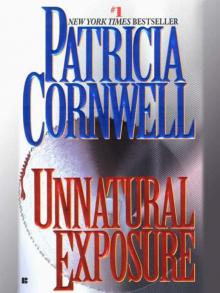 Unnatural Exposure
Unnatural Exposure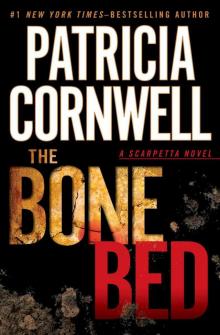 The Bone Bed
The Bone Bed Book of the Dead
Book of the Dead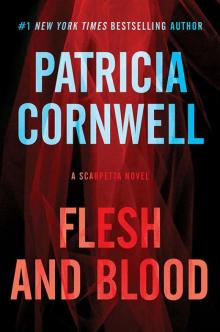 Flesh and Blood: A Scarpetta Novel (Scarpetta Novels Book 22)
Flesh and Blood: A Scarpetta Novel (Scarpetta Novels Book 22)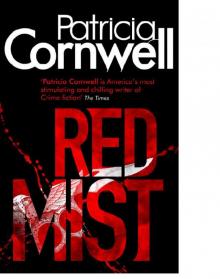 Red Mist
Red Mist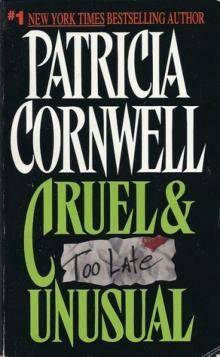 Cruel & Unusual
Cruel & Unusual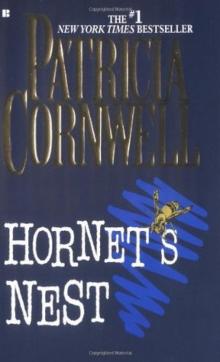 Hornet's Nest
Hornet's Nest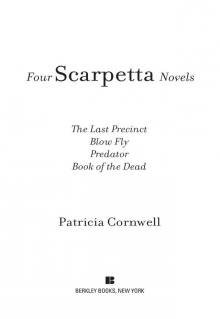 Four Scarpetta Novels
Four Scarpetta Novels Scarpetta's Winter Table
Scarpetta's Winter Table Isle of Dogs
Isle of Dogs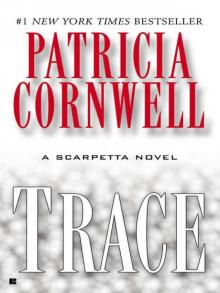 Trace
Trace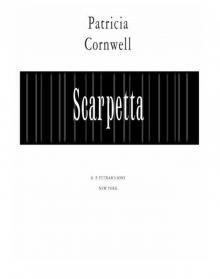 Postmortem
Postmortem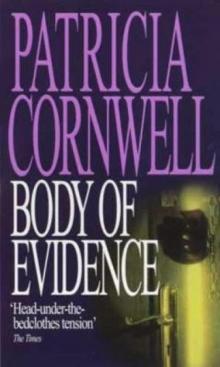 Body of Evidence ks-2
Body of Evidence ks-2 Southern Cross
Southern Cross All That Remains
All That Remains Point of Origin
Point of Origin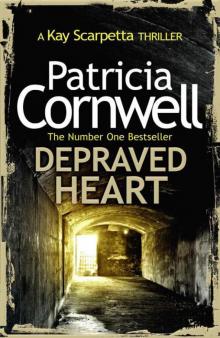 Depraved Heart
Depraved Heart Ruth, a Portrait: The Story of Ruth Bell Graham
Ruth, a Portrait: The Story of Ruth Bell Graham From Potter's Field
From Potter's Field Flesh and Blood
Flesh and Blood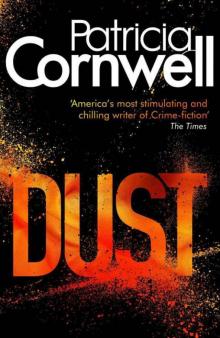 Dust
Dust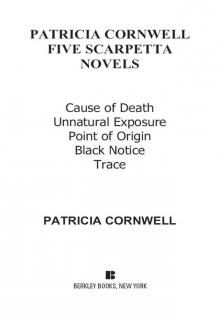 The Body Farm
The Body Farm Port Mortuary
Port Mortuary Quantum
Quantum Portrait of a Killer: Jack the Ripper - Case Closed
Portrait of a Killer: Jack the Ripper - Case Closed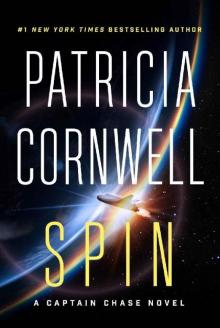 Spin (Captain Chase)
Spin (Captain Chase) Cause of Death
Cause of Death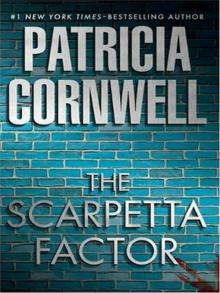 The Scarpetta Factor
The Scarpetta Factor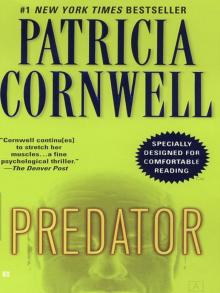 Predator
Predator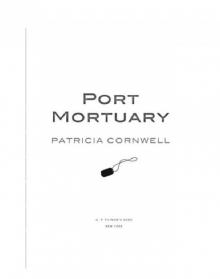 Scarpetta 18 - Port Mortuary
Scarpetta 18 - Port Mortuary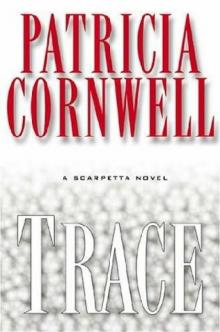 Trace ks-13
Trace ks-13 Portrait of a Killer
Portrait of a Killer Cruel and Unusual ks-4
Cruel and Unusual ks-4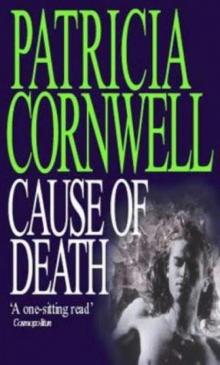 Cause Of Death ks-7
Cause Of Death ks-7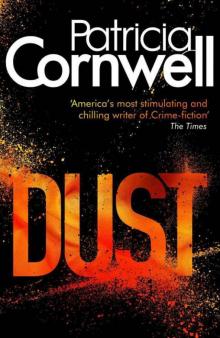 Dust ks-21
Dust ks-21 At Risk wg-1
At Risk wg-1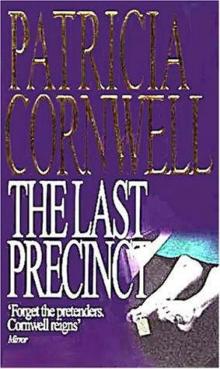 The Last Precinct ks-11
The Last Precinct ks-11 Book of the Dead ks-15
Book of the Dead ks-15 All That Remains ks-3
All That Remains ks-3 Ruth, a Portrait
Ruth, a Portrait Scarpetta's Winter Table (kay scarpetta)
Scarpetta's Winter Table (kay scarpetta) From Potter's Field ks-6
From Potter's Field ks-6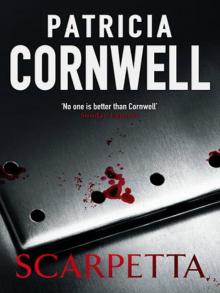 Scarpetta
Scarpetta Isle of Dogs jhabavw-3
Isle of Dogs jhabavw-3 Hornet's Nest jhabavw-1
Hornet's Nest jhabavw-1 The Body Farm ks-5
The Body Farm ks-5 Blow Fly ks-12
Blow Fly ks-12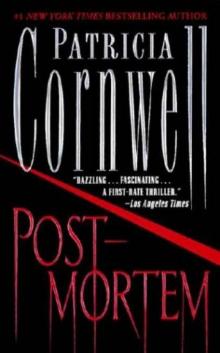 Post Mortem
Post Mortem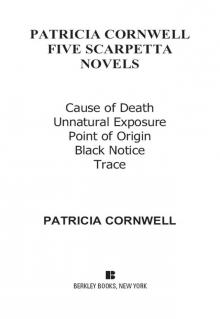 Five Scarpetta Novels
Five Scarpetta Novels Chasing the Ripper (Kindle Single)
Chasing the Ripper (Kindle Single) Point of Origin ks-9
Point of Origin ks-9 Port Mortuary (2010)
Port Mortuary (2010) Unnatural Exposure ks-8
Unnatural Exposure ks-8 Southern Cross uhabavw-2
Southern Cross uhabavw-2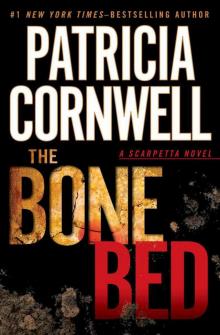 The Bone Bed ks-20
The Bone Bed ks-20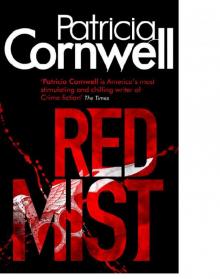 Red Mist ks-19
Red Mist ks-19 Port Mortuary (2010) ks-18
Port Mortuary (2010) ks-18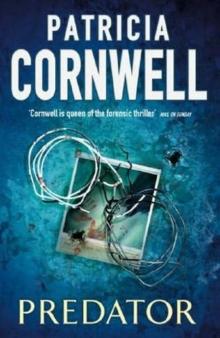 Predator ks-14
Predator ks-14